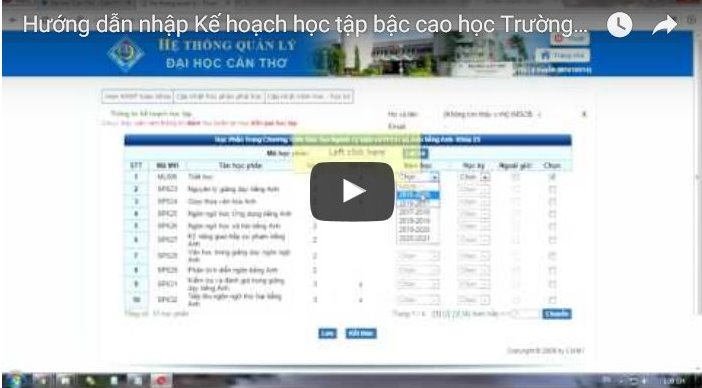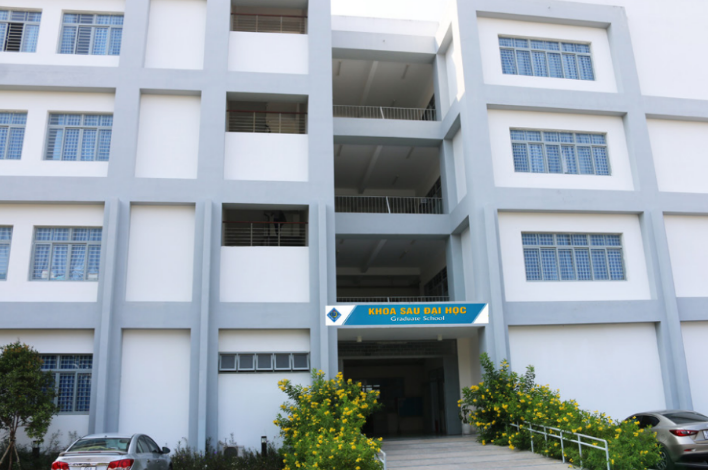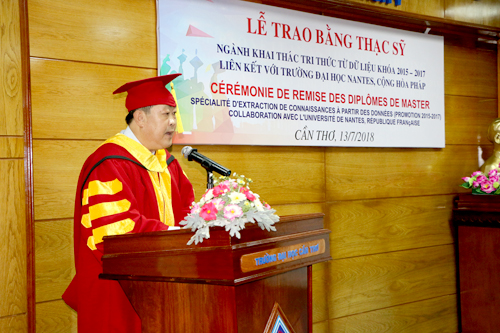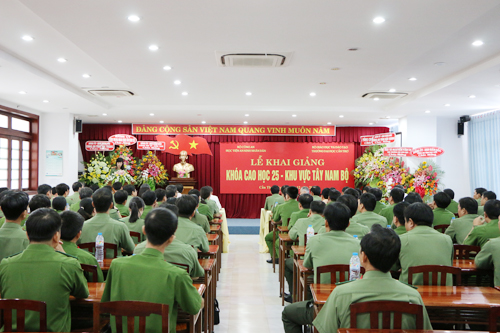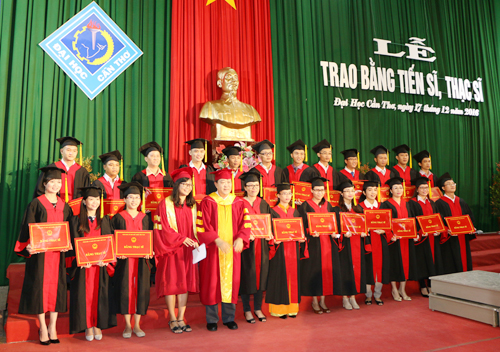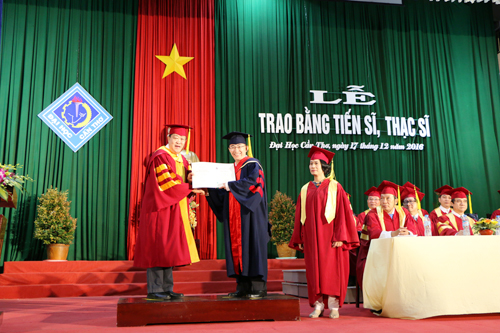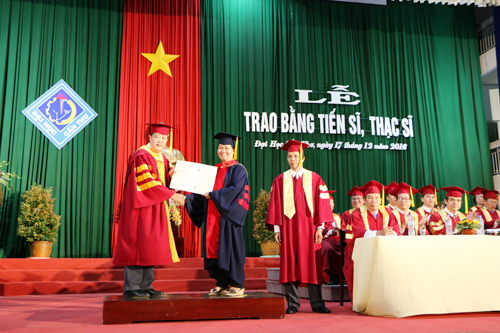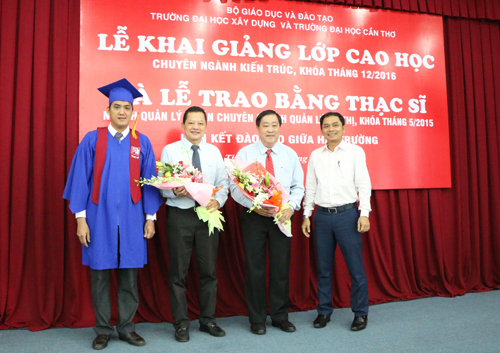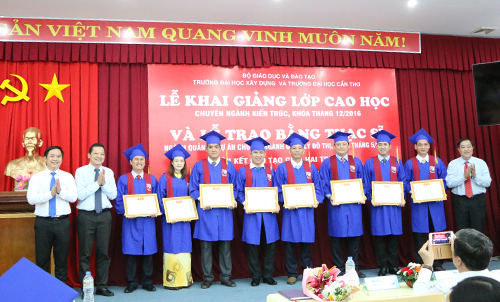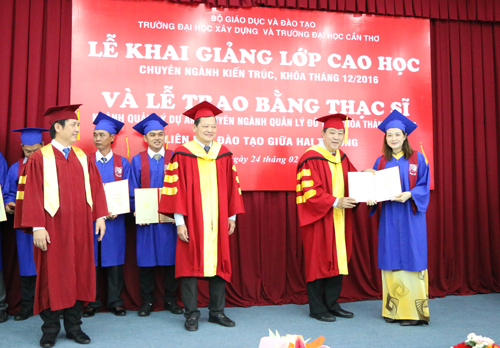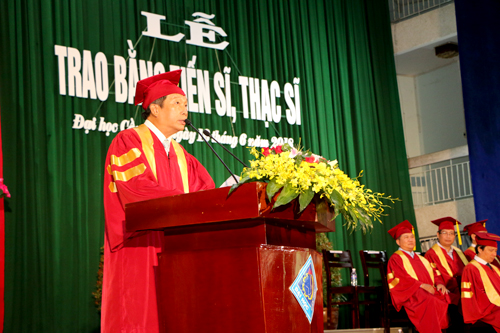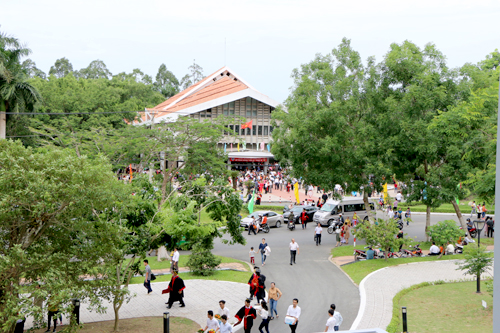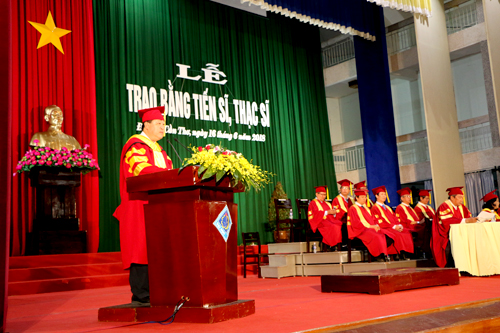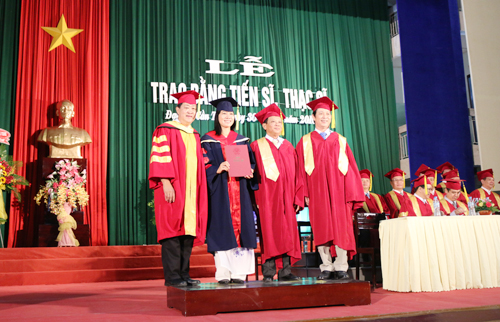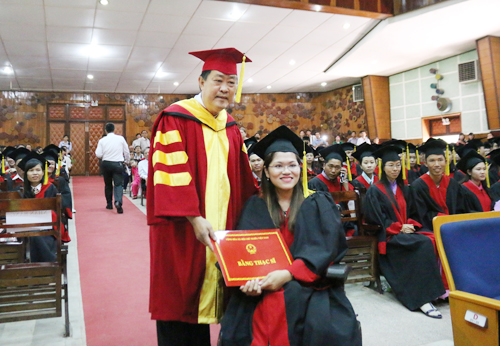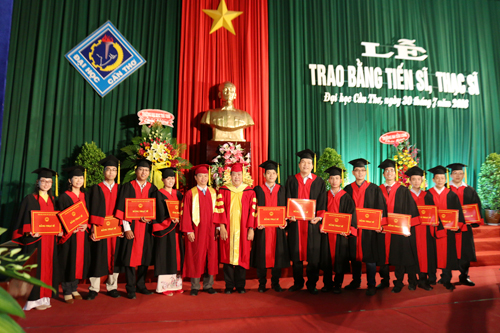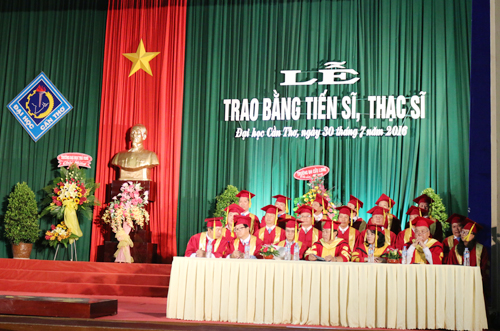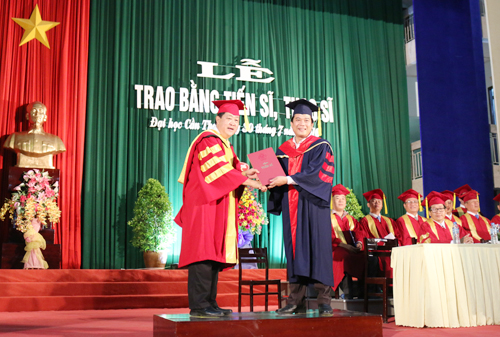
 Tên đề tài: “Giải pháp thúc đẩy mức độ tham gia của cộng đồng vào chương trình mục tiêu quốc gia xây dựng nông thôn mới tỉnh Trà Vinh”.
Tên đề tài: “Giải pháp thúc đẩy mức độ tham gia của cộng đồng vào chương trình mục tiêu quốc gia xây dựng nông thôn mới tỉnh Trà Vinh”.
 Tác giả: Đoàn Thị Nguyệt Minh, Khóa: 2014
Tác giả: Đoàn Thị Nguyệt Minh, Khóa: 2014
 Chuyên ngành: Phát triển nông thôn; Mã số: 62620116. Nhóm ngành: Nông, lâm nghiệp và thuỷ sản.
Chuyên ngành: Phát triển nông thôn; Mã số: 62620116. Nhóm ngành: Nông, lâm nghiệp và thuỷ sản.
 Người hướng dẫn chính: PGS.TS. Nguyễn Ngọc Đệ - Trường Đại học Cần Thơ
Người hướng dẫn chính: PGS.TS. Nguyễn Ngọc Đệ - Trường Đại học Cần Thơ
-
- Tóm tắt nội dung luận án
Luận án được thực hiện nhằm đánh giá thực trạng và phân tích các yếu tố ảnh hưởng đến mức độ tham gia của cộng đồng vào tiến trình xây dựng nông thôn mới tại tỉnh Trà Vinh. Từ đó đề xuất các giải pháp thúc đẩy sự tham gia và phát huy vai trò chủ thể của cộng đồng để đẩy nhanh tiến trình xây dựng nông thôn mới. Nghiên cứu sử dụng phương pháp điều tra phỏng vấn 405 hộ dân tại địa bàn 3 huyện (Tiểu Cần, Càng Long, Trà Cú) theo phương pháp lấy mẫu thuận tiện có điều kiện dựa trên: (1) vùng sinh thái nước ngọt, lợ, mặn; (2) Các mức độ đạt tiêu chí: mức độ mạnh (19/19), Trung bình (12-14/19), mức độ yếu (8-12/19) tiêu chí; (3) Đặc điểm loại hình kinh tế hộ: Hộ khá/giàu, hộ trung bình và hộ nghèo. Bằng việc sử dụng phương pháp phân tích thống kê mô tả; Phân tích nhân tố khám phá và phân tích hồi quy tương quan; Phân tích SWOT, cây vấn đề và cây giải pháp.
Kết quả nghiên cứu: Thành tựu được ghi nhận trong xây dựng nông thôn mới tại Trà Vinh là do sự hợp tác của 2 phía, với vai trò chính là từ người dân và chính quyền làm hậu thuẩn trong giai đoạn đầu (2010-2015). Kết quả cho thấy có sự khác biệt trong việc tham gia cả về hình thức và mức độ tham gia ở điều kiện kinh tế hộ khác nhau: nhóm hộ khá/giàu có mức tham gia cao và nhóm hộ điều kiện kinh tế khó khăn có mức tham gia thấp nhất, chỉ dừng lại ở mức tham gia trên mức độ thể hiện tinh thần trách nhiệm và đưa ra quyết định. Sự tham gia chỉ dừng lại ở mức trung bình. Và 3 yếu tố gây ảnh hưởng đến mức tham gia cộng đồng được nghiên cứu khẳng định: (Văn hóa xã hội tiện ích công cộng; Quy hoạch hạ tầng phát triển tổ chức sản xuất; Đặc điểm cá nhân hộ chính quyền) trong đó nhân tố văn hóa xã hội tiện ích công cộng là ảnh hưởng mạnh đến mức tham gia xây dựng nông thôn mới tại Trà Vinh. Trên cơ sở phân tích hiện trạng, vai trò và các yếu tố ảnh hưởng đến sự tham gia của cộng đồng 2 giải pháp tổng thể 2 góc độ khách quan và chủ quan để nâng cao mức tham gia của cộng đồng được đề xuất gồm: (1) Nâng cao năng lực tham gia cá nhân (Giải pháp nội lực); (2) Nâng năng lực tạo sự tham gia cộng đồng (Giải pháp tác lực) và các hoạt động lớn được thực hiện: Tổ chức quản lý xã hội theo khoa học công nghệ đáp ứng chuyên môn hóa; Xây dựng mô hình cộng đồng văn hóa-xã hội có khả năng lan tỏa lấy an ninh văn hóa làm trọng tâm; Phát triển nền kinh tế sản xuất nông nghiệp; Ưu tiên quy hoạch hạ tầng cơ sở phục vụ trọng tâm tăng trưởng kinh tế hộ làm chủ lực.
- Những kết quả mới của luận án
- Ý nghĩa khoa học:
Luận án với những điểm mới đóng góp về tính lý luận và học thuật là bộ thang đo mức tích cực tự nguyện tham gia trên nền tảng động cơ được thúc đẩy qua việc vận dụng mô hình động cơ thúc đẩy của Porter và Lawler (1981) cùng lý thuyết mối quan hệ chuỗi mắc xích nhu cầu- mong muốn- thõa mãn. Điểm nổi bật nghiên cứu lợi dụng ưu điểm làm nên sự thành công của phương pháp tiếp cận ABCD tác động điểm nạnh, mức tích cực từ trong nội lực để khơi dậy sự tự thân vận động nổ lực vươn lên để tồn tại và phát triển khắc phục căn bệnh trầm kha là thụ động, ỷ lại vẫn tồn tại đâu đó ở các quốc gia đang phát triển.
- Ý nghĩa thực tiễn:
Luận án với những điểm mới đóng góp cho hoạt động ứng dụng thực nghiệm được triển khai tại Trà Vinh cùng các tỉnh khác có điều kiện môi trường sinh thái, kinh tế xã hội tương tự sẽ: Tạo được ảnh hưởng sâu rộng trong chỉ đạo thực hiện XDNTM; Tạo nền tảng căn bản của sự đánh thức tư duy dưới mọi phương cách hướng tới đạt mục tiêu sau cùng là tạo được sự chuyển biến rõ nét trong mỗi người dân và cán bộ, các tổ chức hội đoàn thể chính thức và phi chính thức, Tạo sự lan tỏa mạnh mức tự nguyện tham gia tại tâm được phát khởi.
- Các vấn đề cần tiếp tục nghiên cứu:
1.Phân tích thực trạng công tác phát triển nguồn nhân lực cấp cơ sở tham gia phục vụ công tác xây dựng nông thôn mới tại Trà Vinh;
- Đánh giá sự ảnh hưởng và vai trò đặc điểm năng lực cá nhân đến việc tham gia nâng cao năng lực cộng đồng trong xây dựng nông thôn mới tại Trà Vinh;
- Đánh giá mối quan hệ tác động giữa cải thiện năng lực tạo sư tham gia và động cơ thúc đẩy mức tự nguyện tích cực tham gia xây dựng nông thôn mới tại Trà Vinh
-
- Summary
The current dissertation aimed at evaluating the status and analyzing the factors affecting the participating extent of local communities in the process of new rural development programs in Tra Vinh Province. Based on the results, he research suggested solutions to motivate the participation and active role of local communities to promote the implementation of the new rural development program. The data of the study were collected through interviewing 405 households in 3 districts of Tra Vinh Province (including Cang Long, Tra Cu, and Tieu Can) with samples based on convenient conditions: (1) freshwater, brackish water, and saltwater ecosystems; (2) the degree to obtain criteria: strong (19/19), average (12-14/19), and weak (8-12/19); (3) and economic conditions of households: Rich, medium and poor households. The collected data were analyzed by applying the Descriptive statistics, Exploratory Factor Analysis and regression model, SWOT, problem tree, and solution tree. Results showed that the participation in the implementation of the new rural development program in Tra Vinh Province was the cooperation of both sides: the community and the authority in which local people played a key role and the authority supported in the first phase from 2010-2015. The results indicated that there was a difference in the form and degree of community participation among households depending on their economic conditions: rich households participated in the project more than poor ones. The majority of households took part in the new rural development program only because of responsibility and enforcement at a low extent. The research also found out three important factors affecting to the participating extent of local communities, including public social-cultural convenience, infrastructure planning for economic production organization, and distinctive characteristics of individual households. Among these, public social-cultural convenience had the most powerful impact on the new rural development program in Tra Vinh Province. Based on the study results, two overall solution groups were suggested in order to improve the extent of participation: (1) Promoting individuals’ participating capacity (Internal Strengthening force), (2) Improving community’s participating environment (External Strengthening force) and other important activities such as organizing social management with specialized technology and sciences, building a social-cultural model that can easily spread out and ensure cultural security, strengthening agricultural economy, planning infrastructures mainly to develop individual-based economy.
- New contributions of the dissertation
- Scientific significance
New contributions of the dissertation both in theory and academic are the scales of the positive participation based on motivation through using the Porter and Lawler motivation model (1981) and the chain of satisfying - desired - need theoretical relationship. The highlight of the study is the use of strong and active internal point of ABCD approach to arouse local people on their own to survive and grow from that they can overcome the longtime passive participation in developing nations.
Many groups of variables used in the research based on frames, the general factor of rural social aspects that affected to the participation are systematized in order to find two overall solution groups proposed root causes to improve the extent of participation aimed to satisfy the final target of the new rural development programs.
- Practical significance
New contributions of the dissertation for the practically applying participation activities of Tra Vinh Province to be done in the new rural development programs or the same ecosystem and economy - social condition of other provinces will have been largely influenced in leading the new rural development programs. The research findings would be a good basic in thinking that can be awakened by every method toward getting the final goal making a significant change in local people and officials, the formal and informal unions, specially, the cooperation of the religious organizations also takes advantage in saturating the hearted participation of local people.
- Further research
- Analyzing the status of the promoting human resources in local in the implementation of the building new rural development program in Tra Vinh Province;
- Evaluating the influence and the characteristic personal capacity role in participation to enhance the local people participation capacity in the building new rural development program in Tra Vinh Province;
- Evaluating the relationship between improving participation organizing capacity and motivating active participation in the building new rural development programs in Tra Vinh Province.
- Xem chi tiết nội dung luận án
- Xem thông tin đăng tải tại Website Bộ giáo dục và Đào tạo. (Nhập tên NCS vào ô tìm kiếm)

